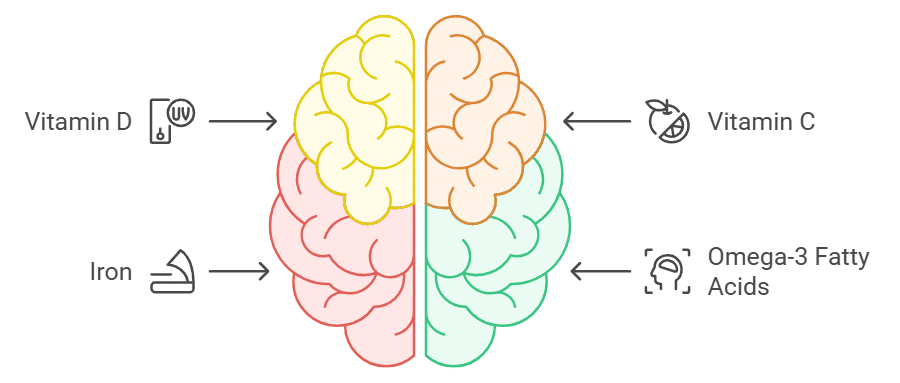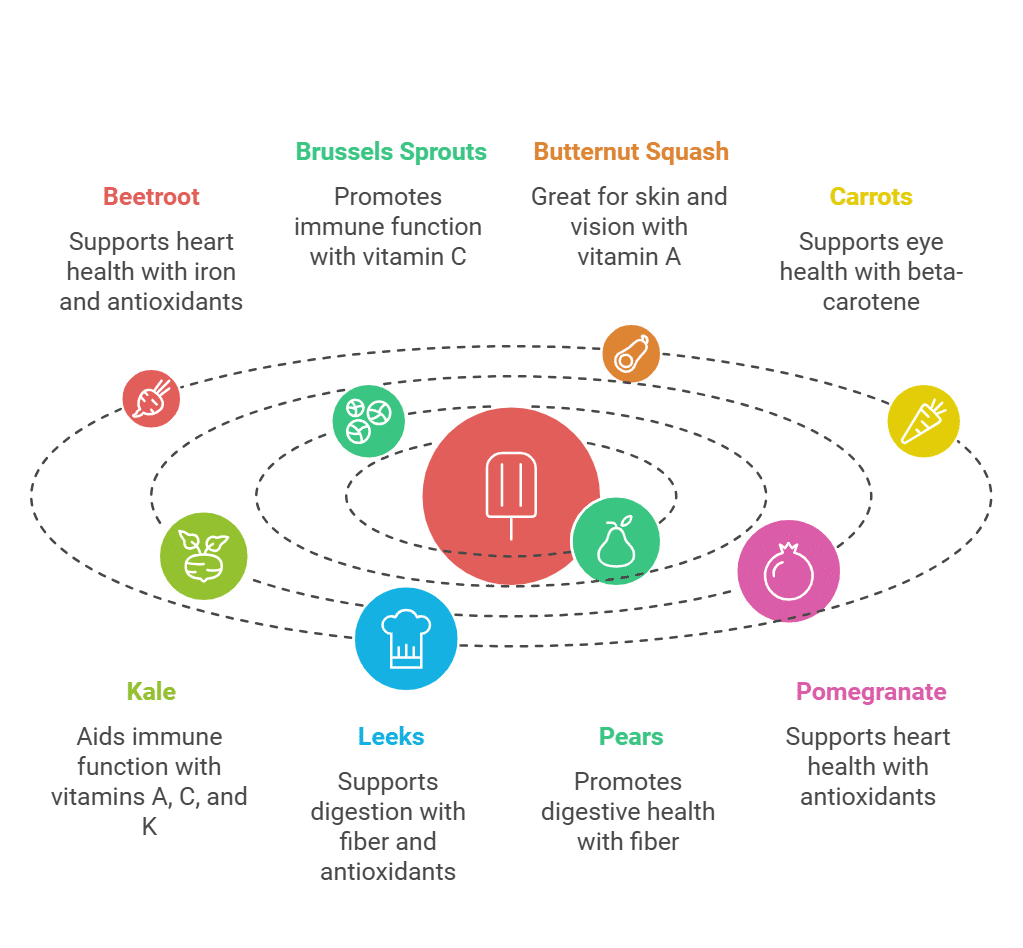Winter Wellness: Tips to Boost Your Health and Mood
Winter can be a challenging time for many of us. With shorter days, colder weather, and the added stress of seasonal pressures, it’s easy to feel low on energy and mood. However, the good news is that what you eat, how you move, and the way you manage sunlight exposure can make a significant difference. In this article, we’ll explore nutritional advice, winter-friendly foods, and practical tips to help you stay healthy, productive, and positive throughout the colder months.

Nutrition for Winter Health
Vitamins and Minerals
During winter, our bodies often need a little extra support to stay strong and energised. Here are some key nutrients to focus on:

-
Vitamin D: Known as the “sunshine vitamin,” Vitamin D is essential for mood regulation and bone health. With limited sunlight in winter, deficiency is common. Fortified foods like cereals, dairy products, and plant-based milks can help, as well as fatty fish like salmon and mackerel. Supplements are also an effective option. The NHS website offers more details about Vitamin D and supplementation.
-
Vitamin C: A powerful antioxidant, Vitamin C helps support the immune system during cold and flu season. Citrus fruits, strawberries, bell peppers, and broccoli are excellent sources. Adequate intake can also help reduce the duration of colds. Learn more about its benefits here.
-
Iron: Essential for energy and oxygen transport, iron is particularly important if you’re feeling fatigued. Red meats, fortified cereals, spinach, and legumes are rich sources. Vitamin C aids iron absorption, so pair them for maximum benefit. More on iron’s role is available here.
-
Omega-3 Fatty Acids: These essential fats support brain function and mood regulation, helping combat winter blues. Include oily fish like salmon and mackerel, walnuts, flaxseeds, and chia seeds. The British Dietetic Association’s Food and Mood guide dives deeper into their impact on mental health.
Winter Superfoods
You can explore all 30 superfoods and their detailed benefits on the BBC Good Food website. For recipe inspiration using seasonal produce, visit BBC Good Food’s Healthy Winter Recipes or the BBC’s Healthy Winter Food Collection.


Hydration and Healthy Snacking
Hydration is essential even in colder months. Herbal teas, broths, and warm water with lemon can help you stay hydrated. When it comes to snacking, choose nutrient-rich options like:
- Nuts and Seeds: Excellent sources of healthy fats, protein, and minerals.
- Yoghurt: High in probiotics and calcium, supporting gut and bone health.
- Dark Chocolate: In moderation, it can improve mood and is rich in antioxidants.
For more snack ideas, check out BBC Good Food’s Healthy Snack Recipes.
The British Dietetic Association’s Depression and Diet guide offers additional insights into mood-boosting foods.

Resources and Services
-
Local Food Hubs: Explore community initiatives that provide affordable, fresh produce while supporting sustainable practices. For example, Keep Wales Tidy offers programmes that connect people with nature and promote local food growing, making it easier to access fresh and nutritious ingredients close to home.
-
British Dietetic Association: Their guides on Food and Mood and Depression and Diet provide expert insights into nutrition and mental health.
- NHS Resources: Learn about essential vitamins and minerals from the NHS website and explore their SAD management tips here.
- Recipe Collections: For healthy and nutritious meal ideas, check out Olivemagazine’s Healthy Winter Recipes and the NHS Healthier Families Recipes.


Movement and Exercise
Physical activity supports mental and physical well-being, especially during winter. Regular movement can combat low energy and improve mood by boosting endorphin levels. Here are some ideas:
-
Indoor Activities: Online yoga, pilates, or dance classes can keep you moving indoors.
-
Outdoor Walks: Embrace winter landscapes by taking brisk walks in parks or nature trails. Layer up to stay comfortable.
Local mental health organisations in Powys also offer accessible movement activities:
-
Mind Brecon’s Groups include gentle exercises and well-being activities.
-
Mind North and Mid Powys offers Walk & Talk groups to encourage physical and social engagement.
-
Mind Ystradgynlais hosts yoga and well-being sessions designed to improve mental and physical health.
-
Freedom Leisure Classes offer a range of exercise opportunities across Powys, including group fitness classes suitable for all abilities.
Exercise has proven benefits for mood and cognition—even small efforts count!
Seasonal Affective Disorder
Seasonal Affective Disorder (SAD) is a form of depression linked to reduced sunlight exposure. Symptoms include low mood, fatigue, and changes in sleep and appetite. Here’s how to address it:
- Maximise Natural Light: Spend time outdoors during daylight hours or sit near windows to absorb sunlight. Even short walks can help boost serotonin levels.
- Light Therapy: Devices that mimic natural sunlight can alleviate symptoms for many people with SAD. Consult a healthcare provider for recommendations.
- Routine and Self-Care: Establish regular sleep patterns, eat balanced meals, and engage in activities that bring joy.
-
Accessing Local Services with Infoengine: Looking for support in your local community? Infoengine is an online directory of services and resources available across Wales. It provides detailed information about organisations and initiatives that can support your health, well-being, and daily life. From mental health and social groups to financial aid and fitness opportunities, Infoengine connects you to valuable resources tailored to your needs.
Whether you’re seeking help with nutrition, winter wellness, or physical activity, Infoengine is an excellent starting point to explore what’s available in your area.
Winter doesn’t have to drain your mood or energy. By focusing on nutrient-rich foods, staying active, and making the most of daylight, you can boost your health and productivity during the colder months. Small, sustainable steps can lead to big changes in how you feel and perform. Why not start today by trying one of the tips above?
Remember, you don’t have to do it alone. There are resources and support networks available to help you thrive this winter.


